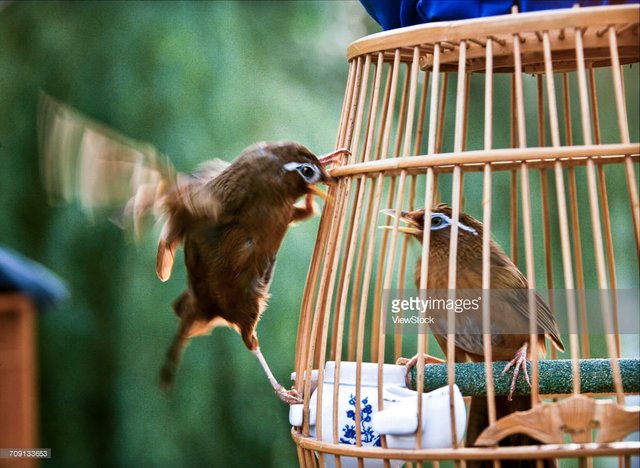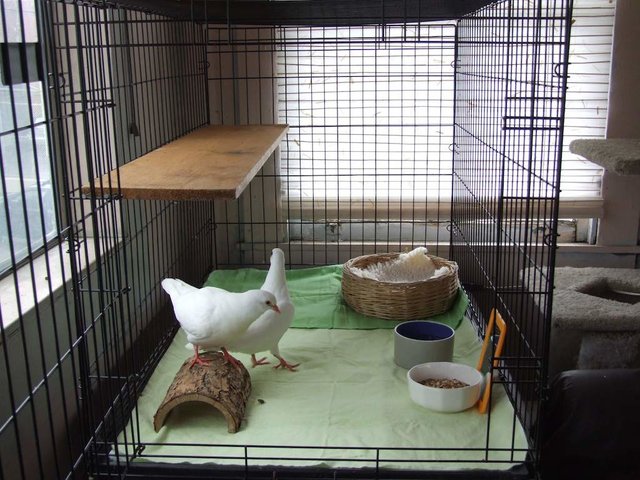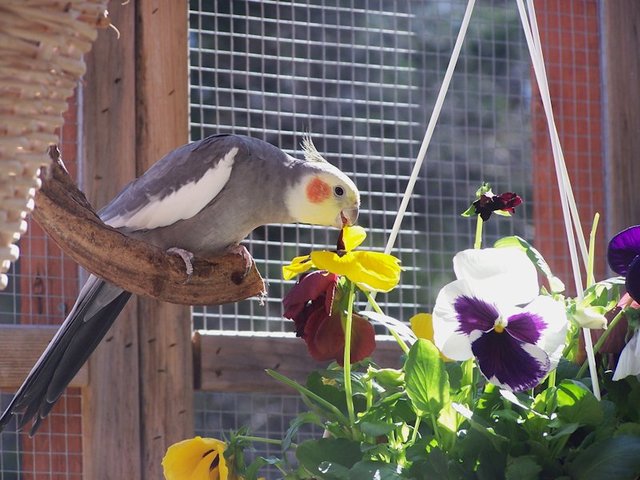how to leave with a bird pet not an imprisoned freind;cage free
When bird owners hear that their pets need to spend several hours a day outside of their cages, they may struggle with finding the time for such a commitment. This may be especially difficult since it is important that the hours outside of the bird cages are grouped together rather than several short choppy periods of time. Longer periods of time outside of bird cages allows the birds to become adjusted to their new environments, making them more comfortable and playful during this time, rather than apprehensive of the change. But this particular health recommendation need not consume all of an owner's free time. Although birds need social interaction with humans, they do not require one-on-one attention the entire time they are outside of their cages. Assuming whatever room a bird is allowed to roam in is bird-proofed (a topic discussed later in this article), there are plenty of your daily activities, during which birds can enjoy outside of their bird cages, including:
Straightening up the house
Paying the bills
Doing laundry
Watching TV
Entertaining guests
Bird owners can plan how much time they are able to devote to interacting with their birds outside of their bird cages and then try to decide on a schedule. Birds will gain the most from a consistently scheduled time outside of their bird cages.
Placing the Bird Cages in Safe Environments
If birds are permitted to spend time outside of their bird cages, owners must ensure that their surroundings are safe. Bird cages should only be placed in rooms that are hazard-free, whether or not the bird is actually inside of the bird cage at the time. Special consideration should be given to kitchens and bathrooms with variant temperatures, hot stoves, sharp items and access to dangerous chemicals. Birds should also only be allowed into secured rooms where escape isn’t a risk. In addition to the personal lose, pet birds can be harmed if they accidently escaped to the outside the home. Because pet birds can be drawn to open areas for flying, owners must make sure there are no open doors or windows in rooms where birds are allowed to be outside of their bird cages. You can use the following checklist to ensure bird cages should only be placed in fully bird-proofed rooms by:
Removing any household plants that could be dangerous when ingested.
Making sure the bird is safe from other pets.
Removing any open containers of water or other liquids, which are a drowning risk.
Paying special attention to open drawers, cabinets and closets that may pose suffocation hazards if birds get trapped inside.
Turning off any fans.
Removing any sharp or pointed objects.
Removing blinds in which birds can become tangled.
Preparing Rooms for Time Outside of Bird Cages
While many bird cages are equipped with plenty of accessories including perches, ladders, swings andtoys, their rooms outside of the cages can lack these essentials for play. The same accessories birds enjoy inside of their cages should be available for their “free time” as well. Bird owners can transform their ordinary living rooms into areas their birds will want to play with a few simple additions. They can hang accessories on the outside of the bird cages to encourage the same exercise as they do inside the bird cages (This includes mirrors, ladders, perches and other toys.). Another popular addition is the use of playstands in different locations around a room. Many of these are able to hold a variety of perches, toys and other favorite accessories birds may like>
Socialization for Birds During the Time Outside of Their Bird Cages
During the time birds spend outside of their bird cages, owners have a great opportunity to bond with them. This socialization is crucial to the birds’ psychological health. Below are several ways owners can bond with their birds when they are outside of their cages.
Think aloud. Explain what you are doing and what you are thinking as you do it.
Share meals with your bird.
Sing and/or dance with your bird.
Engage your bird with his favorite toys.
Try petting your bird.
Read aloud.
Play peek-a-boo.
Try playing fetch using a toy or paper ball.
When PlayTime Is Over, Let Bird Cages Do The Round Up
Because birds will eventually return to their cages on their own to eat, there is no reason to force them back in, causing them unnecessary stress. so there you go my freinds upvote me on steemit so i create more good articles for you
You have a minor misspelling in the following sentence:
It should be friends instead of freinds.well whats the difference it doesn't change the intention its all life